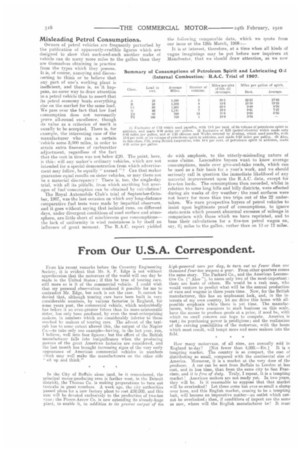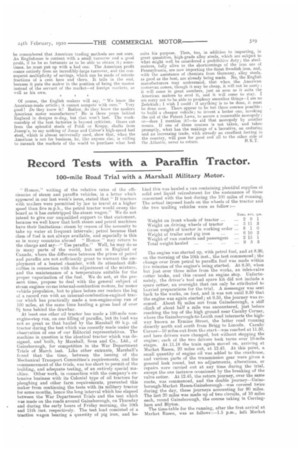From Our U.S.A. Correspondent.
Page 2

Page 3

If you've noticed an error in this article please click here to report it so we can fix it.
From his recent remarks before the Coventry Engineering Society, it is evident that Mr. S. F. Edge is not without apprehension that the motorcars of the world will one day be made in the 'United States; if this be true of touring cars. still more so is it of the commercial vehicle.I could 1g1/1811 that my personal observation rendered it possible for me to contradict Mr. Edge, but such is not the case. It cannot be denied that, although touring cars have been built in very considerable numbers, by various factories in England, for some years past, the commercial vehicle, which undoubtedly has before it an even-greater future than its more-aristocratic sister, has only been produced, by even the most-enterprising makers, in numbers which are considerably inferior to those reached by makers of touring cars. The advent of the taxicab has to some extent altered this, the output of the Napier Co.—to take only one example—having, in the last year. run_, I believe, well into four figures : but the effort of the British manufacturer falls into insignificance when the producing powers of the great American factories are considered, and the last month has brought increasing signs of the very early Appearance of American commercial vehicles in numbers which may well make the manufacturers on the other side " sit up and think."
In the City of Buffalo alone (and, be it remembered, the principal motor-producing area is farther west, in the Detroit district), the Thomas Co. is making preparations to turn out taxicabs in great numbers. A week ago, the city authorities passed plans for a new factory plant to cost £50,000. and this sum will be devoted exclusively to the production of two-ton vans: the Pierce-Arrow Co. is now extending its already-huge plant, to enable. it, in addition to its present output of ten high-powered ears per day, to turn out no fewer than one thousand four-ton wagons a year. From other quarters comes the same story. The Packard Co., and the American Locomotive Co. (" Aiwa "), to name only two of the most-important there are hosts of others. He would be a. rash man, who would venture to predict what will be the annual production of vans and wagons in three years time. Now, for the British manufacturer, this has an unpleasant look, and, in the interests of may own country, let me drive this home with allpossible emphasis while there is yet time. The manufacturers, who have resources to start, business on this scale, have the means to produce goods at a price, if need be, with which no small concern can hope to compete. America is vast; its purchasing power is prodigious; and the realization of the earning possibilities of the motorvan, with the boom which must result, will tempt more and more makers into the field.
How many motorvans, of all sizes, are annually sold in England to-day? [Not fewer than 4,000.—En.] It is a tempting market.. The country is so compact, the cost of distributing so small, compared with the continental size of America. Moreover, it is a market. at the very door of the producer. A car can be sent from Buffalo to London at less cost, and in less time, than from the same city to San Francisco, and it is free of duty. Truly, I repeat, it is a tempting market ! American makers are not ready yet. In two years, they will be. Is it reasonable to suppose that that market will be overlooked! Let there come but ever-so-small a slump over here, and this English market, ceasing to be a tempting bait, will become an imperative matter—an outlet which cannot be overlooked; then, if conditions of import are the same as now, where will the English manufacturer be! It must
be remembered that American trading methods are not ours. An Englishman is content, with a small turnover end a good profit, if he be so fortunate as to be able to obtain it; sonictimes, he must put, up with a bad one. The American profit comes entirely from an incredibly-large turnover, and the consequent multiplicity of savings, which can be made of minute fractions of a cent here and there. It tells in the end. because it puts the maker in the position of being the meter instead of the servant of the market—of foreign markets, as well as his own.
Of course, the English makers will say, " We know the American-made article; it cannot compete with ours." Very good! Do they know it? Rather, du they know the modern American motor manufacturer? He is three years behind England in designs to-day, but that, won't last. The workmanship of the best factories is beyond criticism. Gears cut from the splendid steels of Poldi or Krupp, shafts from Jessop's, to say nothing of Jonas and Colver's high-speed tool steel, which is almost universally used, show that, when the American is out for business, he, like anyone else, is willing to ransack the markets of the world to purchase what hest suits his purpose. Then, too, in addition to importing, in great quantities, high-grade alloy steels, which are subject to what might well be considered a prohibitive duty; the steelmakers, fully alive to the shortcomings of the iron ore of Pennsylvania, are now importing the finest Swedish iron, and, with the assistance of chemists from Germany, alloy steels, as good as the best, are already being made. No, the English manufacturers may understand, that when the, American motorvan comes, though it may be cheap, it will not be nasty ; it will come in great numbers, just as soon as it suits the American makers to send it, and it will come to stay. I am sorry not to be able to prophecy smoother things-1 am no Zedekiah ; I wish I could : if anything; is to be done, it. must be done now. There appear to be but three courses possible: to build a cheaper vehicle; to invent a better one, invoking the aid of the Patent Laws, to secure a reasonable monopoly; or—dare I mention ill—to aid that monopoly by another means. If one of these courses is not taken, and taken promptly, what has the makings of a lucrative, an enduring and an increasing trade, with already an excellent footing in the country, will pass for good and all to the other side of the Atlantic, never to return. H.K.T.








































